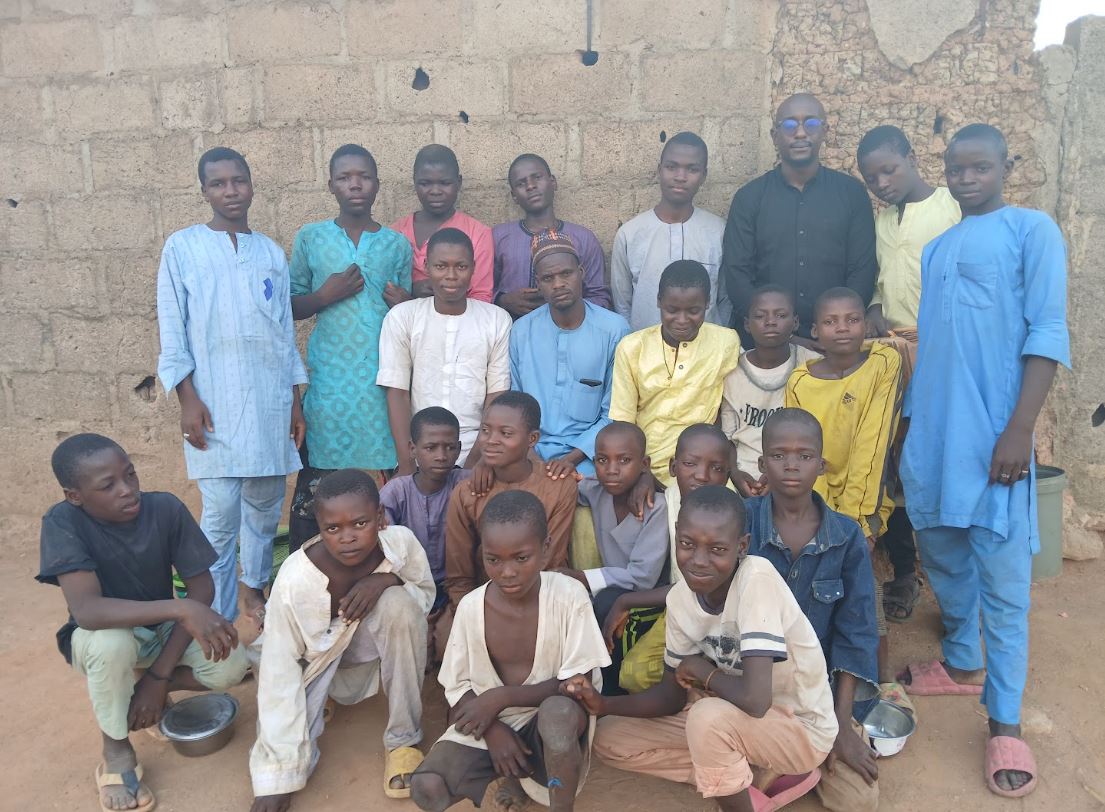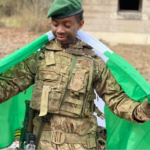Muntari Shu’aibu, 12, was born in Rafin Gora community in the Nigerian state of Katsina. At the age of 8, his father thought he was old enough to go to a Tsangaya school (a Qur’anic learning center), where children are taught about the Qur’an and Islamic laws by a Muslim cleric. Shu’aibu would then travel hundreds of miles to settle in Kaduna State’s Babban Saura community.
This centuries-old tradition has kept countless children away from their families, but for Shu’aibu, his new Tsangaya school became an unexpected bridge to a different kind of education, thanks to Flare Initiative, an organization giving children like Shu’aibu a chance at basic literacy.
Founded by Ibrahim Ciroma, a graphic design artist and changemaker from Kaduna, Flare helps the children learn the English alphabet and build constructions with them.
Rural families living in northern Nigeria whose means cannot afford formal schools or who have closed their minds to western education send their children to distant villages and towns to learn Islamic education. In recent years, however, the Almajiri system has come under heavy scrutiny, with concerns that it pushes some children towards a life of begging on the streets.
Ciroma began by snapping pictures of Almajiri children across Kaduna’s slum communities to bring attention to their challenges.
“Along the line, I realized the need to do more than just displaying the children’s pictures and saying they needed help. I wanted to have tangible actions to show when asked about what I did to help them,” Ciroma explained. This realization spurred him to start the initiative in 2018.
Unlike Shu’aibu, Ibrahim Ali left his hometown of Kargi in Kaduna’s Ikara local government area at the age of 5 to enrol at one of the Tsangaya in the city of Kaduna. “I arrived at the Tsangaya with worn clothes and fear that I would no longer be with my parents,” Ali recounted.
Despite facing the hardship of begging on the streets after their morning and afternoon lessons, Ali successfully learned to read the Qur’an during his time there. Last year, he relocated to the Babban Saura, where he now resides with Shu’aibu at the same Tsangaya.
While practicing a stint in shoe repair, Ali is deepening his studies in Islamic jurisprudence, with a new interest in the English lessons. “I’m determined to improve my English sentence construction and communication skills,” 15-year-old Ali told Prime Progress.
Launching the program
The Flare Initiative launched its pilot program with 50 children, strategically scheduling evening classes on Thursdays and Fridays. This was to ensure minimal disruption to their Qur’anic studies, which take priority from Mondays through Wednesdays.
Sessions usually lasted two hours, from 4:00 to 6:00 pm, Ciroma said.
“We begin with the alphabet, as it forms the foundation of any language. As students progress, we shift the focus towards sentence construction and effective communication skills.” The program teaches the alphabet in a fun way because they believe children learn better by touching things.
“This approach helps the children learn their letters more effectively and one of my team members even incorporates basic arithmetic lessons for students who demonstrate a natural aptitude for numbers,” he added.
Ciroma mobilized a team of 4 educators to deliver the program. Although one team member left to pursue a postgraduate scholarship in the United Kingdom, the rest of the squad remain dedicated to the cause.
Abbas Magaji, the Tsangaya cleric in Babban Saura who has overseen the Tsangaya for 35 years, expressed scepticism about the program, after past disappointments he experienced with other interventions.
“I was hesitant about allowing them to teach the children because in the past, some government institutions and NGOs came to us with promises of support but they failed to deliver,” Magaji bemoaned.
As Magaji’s perspective shifted, he eventually embraced the program. He further highlighted the program’s consistency compared to past efforts that failed. “We have seen projects like BESDA come and go quickly, but the Flare Initiative remains committed,” Magaji stated.
Sharing dreams
Shu’aibu dreams of becoming a medical doctor for his village, and he considers the English lessons as a stepping stone to his dream. Similarly, Ali envisions himself as a successful entrepreneur, confident that his newfound literacy will help him navigate the world of business and connect with diverse clients.
Sufiyanu Abubakar, another student from Katsina State’s Danja local government area, shares this sense of empowerment. Having spent four years memorizing Qur’anic chapters, the 15-year-old now finds value in the English lessons. “It’s a privilege for me because western education wasn’t a priority back home,” Abubakar said.
Unlike some of his peers who got enrolled in schools alongside their Tsangaya studies, Abubakar’s family prioritized only Islamic education. However, he is hopeful that his parents will rethink their stance on western education after completing his studies in Kaduna.
Many of the children confided in Prime Progress that the lessons have become a cherished opportunity for them to learn a new skill. With a sense of pride, they can now write their own names in English and even attempt conversations with each other in the language, even though their grasp of grammar isn’t perfect.
Limited resources
The Flare Initiative is not without its limitations. Even as the program continues to deliver the lessons, Ciroma acknowledges that they can’t achieve everything they want to with their current resources. One hurdle they face is their limited fluency in Hausa. While they use English for primary instruction, explaining complex concepts through Hausa, the local language, can be challenging.
Another obstacle is the lack of consistent support. The initiative has encountered situations where people initially express interest but quickly lose enthusiasm. Ciroma has been advised that financial compensation is key to attracting dedicated instructors. But ideally, the initiative doesn’t have the funding to hire qualified teachers.
The lack of a conducive learning space further exacerbates the challenges. “Our current location isn’t conducive to learning. The last time we requested a permanent space, we were told to purchase a building. But our budget can only stretch to renting a room,” Ciroma lamented.
Prime Progress’ visit to the Tsangaya revealed concerning living conditions. English lessons were held on local mats inside an unfinished building, with some sessions even conducted outdoors by the roadside. The reporter observed a lack of proper sleeping quarters and essential sanitation facilities, including toilets.
Undeterred by the current challenges, Ciroma has a bigger vision of creating a self-sustaining model where the Tsangaya generates income through processing crops like millet or sorghum farmed by the children and clerics. This approach would not only support the initiative but also provide valuable agricultural skills to the Almajiri children.
As Ciroma remains dedicated to upholding child rights and providing a safe and comfortable space for the Almajiri children, he disclosed that the farm work would be voluntary and wouldn’t interfere with the children’s learning or rest periods.
Looking ahead, Ciroma hopes their story inspires others to bridge the educational gap and empower these children. “Our dream is to create a framework that can be copied and implemented in other communities,” Ciroma declared.
Muntari Shu’aibu, 12, from Katsina, Nigeria, was sent at age 8 to a Tsangaya school in Kaduna for Qur'anic education. However, Flare Initiative, founded by Ibrahim Ciroma, provided Shu’aibu an unexpected opportunity for basic literacy, focusing on the English alphabet and sentence construction. Flare launched with evening classes for 50 children to avoid disrupting their Qur'anic studies and employed 4 educators.
Despite initial skepticism due to past failed promises, Tsangaya cleric Abbas Magaji supported the program for its consistency. With limited resources, challenges include lack of fluent Hausa speakers, financial constraints, and insufficient learning spaces. Sessions take place on mats in unfinished buildings or outdoors.
Many students, like Shu’aibu, aspire to new career goals thanks to the program, hoping for broader acceptance of western education. Ciroma envisions a sustainable model generating income from agriculture to support the initiative and provide skills. He aims to inspire similar efforts in other communities, bridging educational gaps and empowering children.






